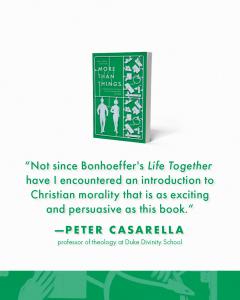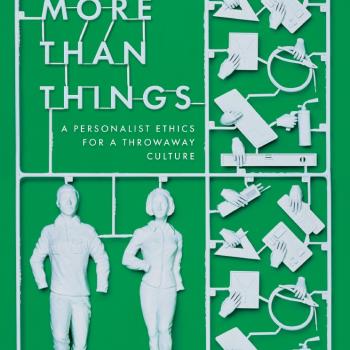
Did you know that you matter more than things, including the images you project? Sometimes it is very difficult to keep this point in mind in a society where all that appears to matter is what the market values. The market values certain images we project and masks we wear. In what follows, I will call for valuing persons over personas, masks, or images.
Michael Sandel, Jonathan Sacks, Barbara Johnson, and Martin Luther King, Jr. encourage and exhort us to make sure we move from a market-driven and thing-oriented society to one that cherishes personal reality above all. I wrote about this theme in my most recent book, More Than Things: A Personalist Ethics for a Throwaway Culture (IVP Academic, 2023). This past Wednesday, I had the privilege to speak on “You Matter More Than Things” to the student body at Westside Christian High School in Tigard, Oregon. In this post, I will highlight one of the points I made: our persons matter more than the images we readily project.
I started out by defining a few of my terms. Referencing Pope Francis’s phrase, “throwaway culture,” I said it is very difficult to treat people as persons when we live in a throwaway culture. To me, a throwaway culture is a society that cheapens human persons. It reduces them to gadgets and tools to use or stuff to buy and sell and then discard. This throwaway mindset is not always overt and explicit. But I do think it is in the cultural air we often breathe and the cultural water we frequently drink.
I then went on to define “person.” Having dedicated the book to my seven-year-old granddaughter Jaylah, as well as a personalist medical ethicist, Robert Lyman Potter, I thought I would share Jaylah’s definition of a person with the highschoolers. Jaylah recently defined a person for me as someone who “colors, plays, goes to ballet, … and fights.” Her definition sounded a lot like my creative and spunky little granddaughter herself!
 My definition is a bit broader, and I go a bit deeper in the book. From my Christian theological vantage point, a human person entails ensouled embodiment. My definition of human personhood also accounts for rationality and reflexivity, as well as individual agency. Moreover, human personhood entails social interconnections which, ideally conceived, involves harmonious relationships with God, other humans, and the world. I could develop this definition at greater length but will keep it short for the purposes of this post. No doubt, the students were more beholden to Jaylah’s definition, as she is far cleverer than her grandfather.
My definition is a bit broader, and I go a bit deeper in the book. From my Christian theological vantage point, a human person entails ensouled embodiment. My definition of human personhood also accounts for rationality and reflexivity, as well as individual agency. Moreover, human personhood entails social interconnections which, ideally conceived, involves harmonious relationships with God, other humans, and the world. I could develop this definition at greater length but will keep it short for the purposes of this post. No doubt, the students were more beholden to Jaylah’s definition, as she is far cleverer than her grandfather.
I then went on to discuss ways in which we readily reduce human persons to things in our throwaway culture. I focused on image, insignia, impulse, and lastly, iPhones, Smart Phones, and AI. The remainder of this brief post will focus on image. I will take up the other three items in future posts.
For the purposes of the high schoolers, I decided to stretch myself and go beyond my normal pop cultural music iconography. My musical icons include old or dead musicians like Bob Dylan, Keith Richards, Jim Morrison, Jimi Hendrix, and Kurt Cobain. Rather, I featured young musical sensation Taylor Swift and her song, “Look What You Made Me Do.” Many publications have sought to decode the song, including Rolling Stone magazine.
There appears to be many messages in the song. But what stood out to me most was a line where Taylor Swift is shown answering a phone call in the music video version. She says regretfully that her old self cannot come to the phone. When asked why that’s not possible, she says that the old Taylor is dead. The closing scene in the video to which I linked above features a collection of Taylor Swifts adorned in different personas. The word “Reputation” appears above and behind them. I asked the high schoolers, “Are we nothing more than the labels others make of us, or the images we project? Persons are more than personas.”
The same thing is true of the orthodox Christian teaching of the triune God. The three divine persons of Father, Son, and Spirit are not images, masks, or personas. Rather, they are durable, eternal persons. God has created all of humanity to reflect God as durable persons, not personas or masks.
I shared with the Westside Christian High School student body that “Persons are not personalities, though we have them. Persons are not masks. At the core of our being, we are persons, just as the God we image is profoundly personal. You are not human projections, but persons.”
The same goes for each of us. We are not human projections, but persons. There may be times that we seek to be discreet and not share about our deepest values and concerns with everyone we meet. Nonetheless, we must be careful not to reduce ourselves to things. Guard against projecting personas in the effort to increase market value. May we continue to grow as persons. Let’s not succumb to image-fixated reputation that eventually dies or gets thrown away. At the end of the day, it is not about what others want us to do or supposedly make us do that matters. What matters most is responding in ways that reflect who we really are as durable, unrepeatable persons.
 PS: You can watch the chapel service and message here, which begins around 21:30. There is a special audiobook sale for the book presently until April 20th. It is selling for 60% the retail price from $29.99 to $1200. Here’s the link and the QR code. There is also a free sample chapter and free downloadable reader’s guide that you can access at the publisher’s book page. Regardless of whether you buy the book, please cherish the fact that you matter far more than things to God!
PS: You can watch the chapel service and message here, which begins around 21:30. There is a special audiobook sale for the book presently until April 20th. It is selling for 60% the retail price from $29.99 to $1200. Here’s the link and the QR code. There is also a free sample chapter and free downloadable reader’s guide that you can access at the publisher’s book page. Regardless of whether you buy the book, please cherish the fact that you matter far more than things to God!













